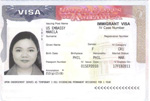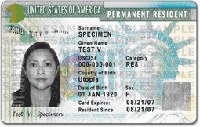Frequently Asked Questions
A fiance visa petition must be filed in the United States.
A fiancee is considered an intending immigrant and therefore must present documents similar to those required for an immigrant visa applicant. These include: a valid Philippine passport, a copy of your birth certificate issued by National Statistics Office (NSO) and printed on NSO security paper; legal documents proving the termination of a previous marriage; NBI clearance, police certificates from all foreign countries where the applicant lived for at least six months starting at the age of 16; evidence of the relationship with the petitioner; evidence of financial support; a medical examination completed by St. Luke’s Medical Center Extension Clinic and visa photographs. Evidence must be presented that the couple met in person within the past two years before the petition was filed.
If an applicant wishes to advance the visa interview appointment, he/she should write the Embassy or call the Immigrant Visa Call Center to request an earlier appointment. Requests for earlier appointments are granted only on a space available basis.
A K1 Fiancee Visa is valid for four months from the date of its approval. But this may be revalidated by a consular officer provided that both parties are still legally free to marry. It is recommended to gather all the necessary documents for visa interview appointment as soon as possible.
No, it does not. The K1 visa is a non-immigrant visa, which allows the holder to stay in the United States on a temporary basis. After the marriage takes place, the alien spouse must contact the USCIS to obtain conditional permanent residence status. The Filipino spouse may apply for removal of the conditional status and become a lawful permanent resident after two years.
Yes we can! We have helped MANY people with Hepatitis B success be granted their Fiancee Visa. With our help you have nothing to worry about.
The Filipino fiancee has 90 days from admission into the United States to marry his/her petitioner. The K1 visa does not allow the bearer to marry anyone other than the petitioner. After the marriage, the couple must contact the file an Adjustment of Status or legal status in the United States will be lost.
No. The K1 visa is a single-entry visa, which means that the K1 bearer who leaves the United States without changing marital and immigration status will not be able to re-enter the country on the same visa. A new petition and visa would be required.
K1 applications are subject to the same review standards as immigrant visa applications. The main reasons for visa refusal are: lacking documentation; need to review or verify evidence; lack of genuine relationship; misrepresentation of facts, medical or criminal grounds and potential public charge.
A common basis for refusal is a prior marriage for the beneficiary or the petitioner that has not been legally terminated. There is no divorce in the Philippines. A consular officer will only accept a death certificate or a court ruling of annulment or of presumptive death as evidence that a Filipino marriage has been terminated. An American may terminate a Filipino marriage through a U.S. divorce.
1. Missing documents
2. Incorrect paperwork
3. Insufficient income/savings of the U.S. citizen sponsor
4. A very large age difference between the couple can cause concern. However, there is no specific age limitation. Yes, a beautiful 21 year old Filipina lady really can fall in love with a 65 year old American man. We have seen this happen many times and we have successfully had visas approved for couples with a very large age difference. Filipino woman tend to be less concerned with superficial attributes than American women. Most Filipino woman are looking for a loving and stable man who will treat them well. They are much less concerned with the age of the man and more concerned with the quality of his character.
5. Fiancee can not obtain written consent from the ex-husband for their child to leave the country
6. Fiancee has a very serious contagious illness (such as tuberculosis).
7. Petition includes a document that is deemed to be fraudulent
8. Couple lacks sufficient evidence of recent day-to-day contact
9. Fiancee interviews poorly and the consul doubts that there is a bona fide relationship with the U.S. citizen
10. Fiancee has relatives or friends in the U.S. who seem to be taking too large a role in match-making
11. Fiancee was previously in the U.S. and overstayed the visa
12. Fiancee commits a misrepresentation during the interview (or so it seems to the interviewing officer)
13. Fiancee has a criminal record
Only the unmarried, minor children (below 21 years old) of the Filipino fiancee can be included in the K1 petition and are eligible to apply for a K2 visa. If they are unable to depart with their Filipino parent, children who are named in the petition have one year (from the time the K1 visa is issued) to be issued K2 visas. They must apply for visas in a timely manner to allow visa issuance within the required time, otherwise the children will no longer be able to derive any immigration benefit from their parent’s K1 visa and new immigrant visa petitions need to be filed on their behalf.
Yes. When the fiancee enters the United States he/she will be eligible to apply for a work permit after we file for an Adjustment of Status for them. This will give them an Employment Authorization card.
Yes. The children are eligible for K2 Visas which would allow them to accompany the Fiancee or follow the Fiancee within 12 months of visa issuance. If the children do not apply for a K2 Visa, they may also be eligible for a K2 Visa after the Fiancee is married as long as the children apply within 1 year of the Fiancée’s K1 Visa issuance.
A U.S. Citizen may not petition for more than one K1 Visa at a time. However, if the marriage from a prior K1 Visa does not take place and the fiancee leaves the U.S., the U.S. Citizen may petition for the same fiancee or another one in the future.
It is usually available for pick-up within 5-7 days but if delivered by courier it could take 1-4 weeks.
No. Unfortunately, this benefit is only available to U.S. Citizens, you must be a U.S. Citizen to be eligible to file for a K1 Visa Petition.
No. It really doesn’t matter whether you are there or not. It is 100% the consular officer’s prerogative to allow or disallow you in the interview room. In all cases your participation is not required unless the officer asks you something. The purpose of these interviews is to judge the fitness of the foreigner for entry/residence in the US and to satisfy the examining officer that the foreigner is entering into the arrangement with full knowledge and free will. If you come on too strong and ‘eager” it could look ‘fishy” to the officer. You should sit down in person or over the phone or computer with your fiancee’ just prior to the interview and go over names, dates facts on the petition itself and your background papers, so everything is fresh in your minds whether you are attending the interview or not.
Yes, it’s nice moral support, but the money might be better spent on a nice honeymoon.
This is the most asked question.
Securing a US tourist visa is not a simple task. There are a lot of strict conditions and requirements that need to be complied with before the highly coveted B-1/B-2 visa may be issued. A Tourist Visa is “possible”, although highly improbable. The U.S. Embassy in Manila denies the majority of tourist visa applicants. In more than a few occasions, applicants who are confident of being granted a US tourist visa are shocked by its denial.
Although not an official requirement, those having success in achieving a tourist visa have held the test of being able to demonstrate proof of their return to Philippines at/prior to the end of any would be tourist visa, which tends to need lots of Peso in the bank under a long standing high balance bank account, deed/title to house/lot and car, business, spouse/children, etc. any/all of which show ties to Philippines and a commanding reason to return and not disappear.
he issuance of a tourist visa is not a sure-fire guarantee that the applicant will be allowed entry in the US since said holders are still subject to the scrutiny of the Department of Homeland Security (DHS) officials who are likewise empowered to deny entry even to valid tourist visa holders.
If they suspect that the fiancee is trying to get a tourist visa for the purpose of getting married here it will be seen as an attempt to short-circuit the immigration process, and reason for instant denial.
Don’t attempt to ‘game’ the system by applying for a tourist, student or employment visa for your Fiancee. Not only does this waste time waiting to hear that your Fiancee’s application has been rejected, but it serves to flag your Fiancee as someone probably attempting to enter the U.S. under false pretenses. All Fiancee visa applications are initially viewed skeptically by USCIS and U.S. State Department by the underlying assumption that a possible attempt to circumvent U.S. immigration laws is being attempted. The officials view their mission is to catch fraud, not bring happy couples together. Applying for a Fiancee visa after unsuccessfully applying for other visas subjects your Fiancee to extra scrutiny and delays at best.
The Filipino fiancee has 90 days from admission into the United States to marry his/her petitioner. The K1 visa does not allow the bearer to marry anyone other than the petitioner. After the marriage, the couple must file an Adjustement of Status to get your Filipino spouse conditional permanent resident status (a green card). We can assist you with filing your Adjustement of Status.
No. The K1 visa is a single-entry visa, which means that the K1 bearer who leaves the United States without changing marital and immigration status will not be able to re-enter the country on the same visa. A new petition and visa would be required.




